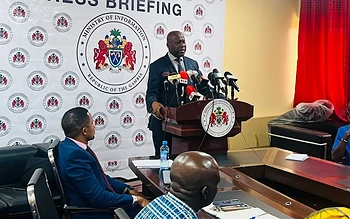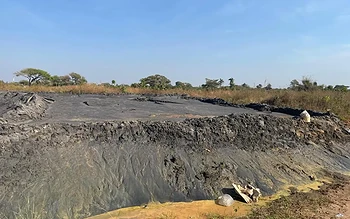![]()
Denver, Colorado, US- The landmark trial of Michael Sang Correa in the US state of Colorado has entered its fourth day with the continuation of witness testimonies and for the first time since his arrest six years ago, Correa’s past confessions were brought to light.
The prosecution played audio recordings of Correa’s interview with federal agents where he admitted to being a Jungler and participated in the arrests of individuals after the 2006 attempted coup.
The Junglers were an elusive team of the Gambian military operating under the State Guards which face allegations of routine extrajudicial executions and tortures on the orders of former dictator Yahya Jammeh.
“I’m sorry… if I can reverse the situation… I am sorry. Did I take pleasure in it? It is unfortunate. Can I stop it if I had the power? Yes, I would have. Did I witness some of my colleagues torturing people? Yes. But I never took part. Did I kill people? Never,” said the defendant, who appeared to have a stammer.
However, The Gambia’s truth commission has found Correa responsible for at least 11 murders.
According to immigration records, Correa entered the United States with a diplomatic visa issued for him to attend the United Nations General Assembly in September 2016 as Vice President Isatou Njie Saidy’s bodyguard. This was held in New York from 20-26 September 2016.
In the audio recording, Correa told federal agents in 2019 that he was not aware that Yahya Jammeh lost the election until he was in the US.
He claimed that he did not return to The Gambia because his friends called to tell him about Jammeh’s election loss and he was advised not to go back.
“Yahya Jammeh lost. I was scared because I will go to jail for things I have not done. That is why I decided to stay around,” he claimed.
However, the stamp in his passport showed that he entered the United States in September 2016 and in December 2016.
As The Gambia’s 2016 presidential election was held on 1 December, this makes his claim of knowing Jammeh’s defeat in the US misleading.
Regarding the March 2006 coup, he told investigators that his role was to only arrest individuals implicated and take them to the National Intelligence Agency. He denied taking part in any other thing than to arrest people whose names they were given and take them to the National Intelligence Agency.
Garrison told the court that there was an order for the defendant’s deportation from the United States and he [Correa] was fighting that in court. The witness added that he was closely monitoring that trial to see how it could affect their investigations. If Correa had been deported, it means the US would no longer have had the jurisdiction to indict and try him.
In the audio recording of the court proceedings on his immigration status, when his lawyer (not the lawyers in this trial) asked, Correa said he did not run away from prosecution but he was on vacation to see his brother living in Tennessee who he had not seen for many years and that he had plans of leaving afterwards. “Now the government that came in started to go after some of the others that had stayed. That’s why I decided to stay.”
The government will continue playing the audio recordings next week.
Sanctuary in Senegal
“Michael stop!” and he stopped. Demba Dem recalled hearing Musa Jammeh, a Jungler and the principal protection officer to former president Yahya Jammeh, order the defendant when he had a plastic bag over his head. He told the court that the defendant was the “only Michael that they [Junglers] have.”
Demba Dem was a member of parliament for former president Yahya Jammeh’s party. He was arrested at the National Assembly for his alleged involvement in the 2006 coup attempt. Dem eventually spent 1 year and three months at the Mile 2 prisons.
Like others suspected of being part of the coup, he was tortured at the National Intelligence Agency by the Junglers, including electrocuting him and putting plastic bags over his head. And even after he was released and fled to Senegal, NIA agents were sent to re-arrest him – although they did not succeed.
The prosecution witnesses explained to the jury how, when people feared for their lives in The Gambia, including those who did not want to follow orders from then president Yahya Jammeh, they could flee the country mostly to Senegal – where he could not harm them.
Lieutenant Colonel Sainey Bayo cited Major Kalipha Bajinka’s escape, a soldier, now deceased, who was one-time State Guards Commander. He fell out of favour with the former president and later fled The Gambia.
Bayo himself was detained at the Mile 2 prisons and taken to the NIA where he was tortured. Although his statement was taken, unlike the others, he was not prosecuted.
The defence counsel Mathew Belcher put it to the witness that when Kalipha Banjinka escaped from his residence to Casamance in southern Senegal because he was suspected of a coup, Yahya Bajinka, his brother, ended up in prison for being Kalipha’s brother. At least two other family members of Major Bajinka were arrested following his escape. Bayo said he knew that he was released but did not know when he was released or escaped.
Prosecutor Marie Zisa asked the witness if it was fairly easy to travel from Gambia to Senegal. Bayo agreed, describing the border as porous.
The defence counsel Belcher asked Demba Dem if following his release, he fled to Senegal because he did not feel safe remaining in The Gambia. The witness said it was not because of his safety that he left. “Not for safety or anything.” The counsel told the witness NIA agents were sent to re-arrest him and bring him back to The Gambia. The witness retorted that they were not successful because the Senegalese authorities made sure he was safe.
Challenging Jammeh’s orders
“Did the National Assembly, when one of their members is arrested in this manner, do anything to intercede and stop President Jammeh from arresting a member of parliament?” Belcher asked.
Dem responded that he did not know. Belcher further asked him if any branch of government interceded to stop a member of parliament from being arrested by Jammeh.”
“Junglers made the arrests.”
He then asked the witness if the police representative in the interrogation panel did not do anything on his behalf when they saw that he was arrested.
“Not to my knowledge,” he replied.
Tracing Correa
On April 9, Special Agent Mathew Gifford of Homeland Security (HSI) testified about how the United States was able to trace Correa when his issue was raised, leading to his arrest in September 2019. Gifford’s office is in Dakar, and Gambia being one of the countries under his “areas of responses.”
Gifford explained to the court that they knew Correa overstayed his visa in the United States but they did not know where he was. Knowing that he will likely send money back home, they traced him through Western Union.
Retired special agent Barton Garrison, who investigated and arrested him, testified on April 10, telling the court that they also found out that Correa and his wife divorced and discovered that “the phone number his wife used on the divorce papers matched the number Correa used on the Western Union.”
Mariam Sankanu’s trip to the United States of America to cover this trial has been funded by CJA.


